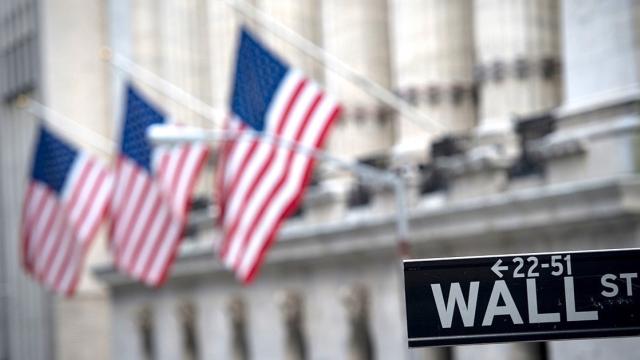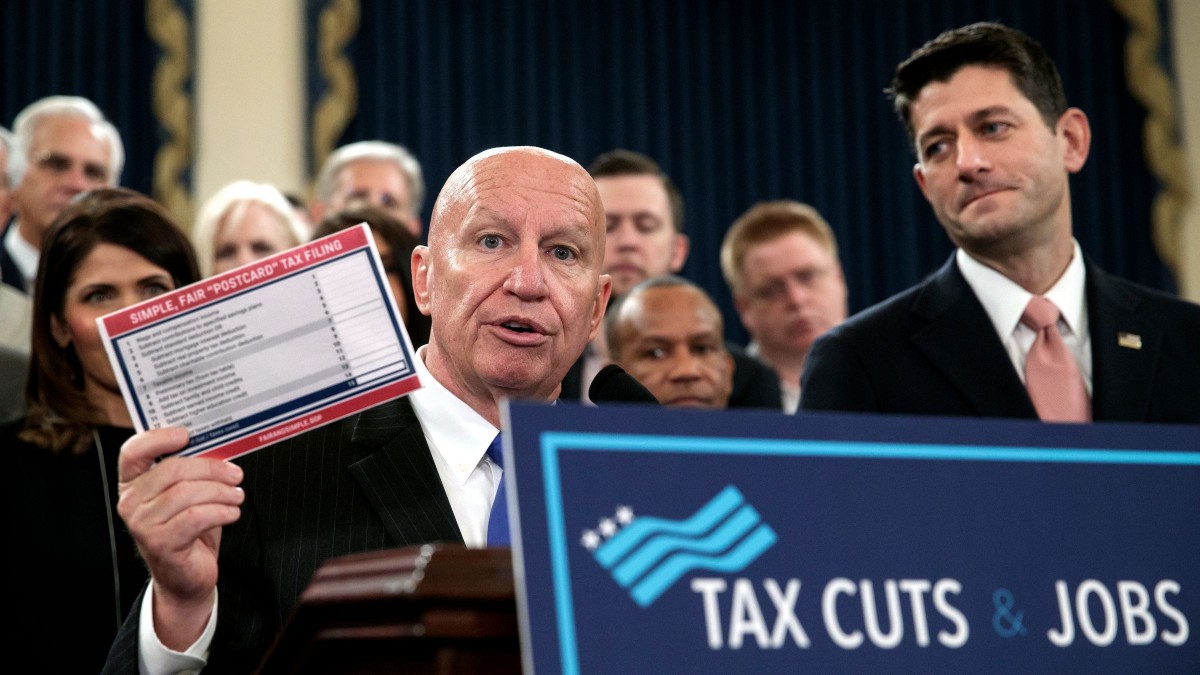
Some of the biggest winners from President Donald Trump’s new tax law are corporate executives who have reaped gains as their companies buy back a record amount of stock, a practice that rewards shareholders by boosting the value of existing shares.
A Politico review of data disclosed in Securities and Exchange Commission filings shows the executives, who often receive most of their compensation in stock, have been profiting handsomely by selling shares since Trump signed the law on Dec. 22 and slashed corporate tax rates to 21 percent. That trend is likely to increase, as Wall Street analysts expect buyback activity to accelerate in the coming weeks.
“It is going to be a parade of eye-popping numbers,” said Pat McGurn, the head of strategic research and analysis at Institutional Shareholder Services, a shareholder advisory firm.
That could undercut the political messaging value of the tax cuts in the Republican campaign to maintain control of Congress in the midterm elections.
Since the tax cuts were enacted, Oracle Corp. CEO Safra Catz has sold $250 million worth of shares in her company — the largest executive payday this year. Product development head Thomas Kurian sold $85 million. The sales came after the company announced a $12 billion share repurchase.
Mastercard CEO Ajay Banga sold $44.4 million of stock in May, the largest single cash-out by an executive of the company in at least 10 years, months after the company announced a $4 billion buyback of its own stock.
Two days after Eastman Chemical announced it would purchase $2 billion of its own stock, CEO Mark Costa sold 55,000 shares for $5.4 million.
The SEC requires company executives to disclose share purchases or sales within two business days. Companies emphasize that their executives’ share sales are often scheduled at regular intervals well in advance. In Banga’s case, he has routinely sold shares once a year, and always in May, since 2013.
Yet the insider sales feed the narrative that corporate tax cuts enrich executives in the short term while yielding less clear long-term benefits for workers and the broader economy. Critics of insider sales argue that they diminish the value of paying C-suite employees in shares — a practice that’s intended to give them a greater stake in the long-term health of the company — and can even raise questions about the motivation for the buybacks themselves.
Following the tax cuts, roughly 28 percent of companies in the S&P 500 mentioned plans to return some of their tax savings to shareholders, according to Morgan Stanley. Public companies announced more than $600 billion in buybacks in the first half of this year — already toppling the previous annual record.
Year to date, buybacks have doubled from the same period a year ago, Merrill Lynch said in a July 24 report, citing its clients’ trading activity. “Last week we noted that buyback activity [was] poised to accelerate over the next six weeks, and indeed, corporate clients’ buybacks picked up to a two-month high and the 6th-highest level in our data history,” the company said.
The correlation between corporate buybacks and insider sales is clear, according to SEC Commissioner Robert Jackson, a Democrat. He studied 385 buybacks since the beginning of 2017 and found that after half of them, at least one executive sold shares within the next month.
The link between the tax cuts and big executive payouts, fueled by buybacks, is also plain, according to one institutional research firm.
“Stock buyback announcements in the U.S. have swelled to the highest levels on record in the wake of last year’s corporate tax cut,” said TrimTabs Investment Research in a July 10 report. “Corporate America’s actions suggest that most of the benefits of the corporate tax cut will flow to investors in general and top corporate executives in particular.”
To be sure, 44 percent of companies say they also plan to reinvest some savings in their operations through initiatives like new factories, research and development and higher wages, according to Morgan Stanley. That's the kind of uses that featured prominently in Republicans’ marketing of their tax bill.
But that spending hasn’t been as immediate and could be headed off by economic headwinds. The Federal Reserve has cited anecdotal evidence of companies scaling back planned capital expenditures over fears of a trade war. And while more than two dozen companies announced one-time bonuses to employees after the tax bill, wage growth is still sitting at a lackluster 2.7 percent.
“What did companies do with their cash?” said the Morgan Stanley analysis. “In short, a large increase in stock buybacks was the biggest change” in the first quarter of this year from the last quarter of 2017.
Republicans and business groups point to ways that the tax cuts are helping the middle class.
“Most Americans are invested [in stocks] either directly or through 401(k)s or through pension funds or through some mechanism,” said Rep. Tom MacArthur, a member of the House Financial Services Committee and a former CEO.
As more people are retiring and selling their shares, companies are scooping them up with buybacks, the New Jersey Republican said. “Personally, I don't think that’s usually a good way to create value for a company, to buy back its own stock. But let’s not forget who they buy their stock back from.”
“Evaluating tax reform through the lens of executive compensation misses the majority of the picture,” said Chris Netram, vice president of tax and domestic economic policy at the National Association of Manufacturers, a lobbying group.
“Lower [tax] rates and investment incentives have led to robust increases in hiring, equipment purchases and worker pay and benefits,” he said, adding that surveys of NAM members show businesses plan to invest their tax savings in their operations, hire employees and increase wages and benefits.
Yet the lower rates have also led to robust stock sales by executives.
In a speech last month, the SEC’s Jackson said, “There is clear evidence that a substantial number of corporate executives today use buybacks as a chance to cash out the shares of the company they received as executive pay.
“In fact, twice as many companies have insiders selling in the eight days after a buyback announcement as sell on an ordinary day,” he said.
On Feb. 28, TJX Cos., the parent company of T.J. Maxx stores, announced a new stock buyback plan as part of an earnings announcement, boosting the department store’s stock above $82. On March 1, Carol Meyrowitz, an executive and former CEO, sold $11 million in shares. In the 30 days following the buyback announcement, TJX CEO Ernie Herrman sold $2.8 million of shares.
Erika Tower, a TJX spokeswoman, said executives were prohibited from trading in 2018 prior to the Feb. 28 announcement. Meyrowitz and Herrman have sold stock for years while the share price has kept going up, she said. “Meyrowitz and Herrman continue to hold very large stakes in the company,” Tower said.
On Jan. 26, the North Chicago-based AbbVie announced strong profits and increased its earnings guidance for 2018. The pharmaceutical company estimated an effective tax rate of about 9 percent in 2018. AbbVie’s shares jumped to a multiyear high above $120.
On Feb. 15, the company announced a new, $10 billion stock buyback plan. From Feb. 20 through March 1, eight executives sold a total of $26.8 million worth of stock. Throughout this period, the stock stayed above $114. It has since dipped to $90.56, as of July 27.
Cigarette-maker Altria announced a $1 billion buyback on Feb. 1. From Feb. 8 through March 2, four executives sold a total of $1.8 million. Chief Executive Craig Johnson sold $995,734 eight days after the buyback was announced. No Altria executives sold shares prior to the buyback announcement in 2018.
Representatives for Eastman Chemical and AbbVie declined to comment. Altria did not immediately respond to a request for comment. Oracle also declined to comment.
Mastercard spokesman Seth Eisen said: “You’re trying to make a connection where one doesn’t exist. There’s nothing notable about this transaction,” he said of Banga's share sale. Banga’s annual financial management plan was preplanned, he said.
These legal trades occur routinely regardless of a firm’s share price. Executives will often prearrange sales of their stock to avoid a perception that they are selling at the most valuable point in time for them.
Charles Gabriel, president of Capital Alpha, a Washington analysis firm, said executive compensation “will unlikely prove decisive this fall, with the Trump message machine on the improving economy."
Still, he said, it “will become a hardened talking point for House Democrats in their campaign messaging.”












